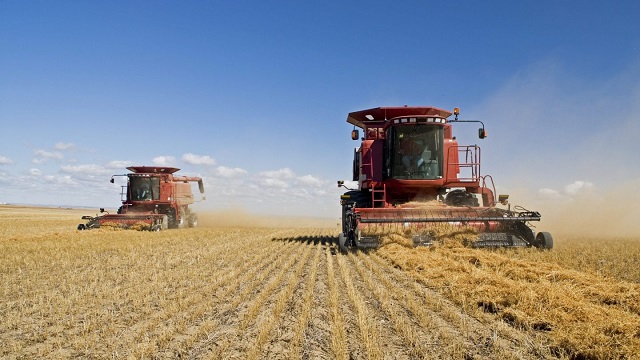Agriculture
Late Spring = Short Season – Double Up on Early Harvest!

Apr 10, 2018 Sundre, AB – As prairie farmers long to see snowdrifts finally disappear so they can get busy with spring work, an Alberta seedgrower proposes a plan to gain some valuable time in what could become a short season.
In fact, Bob Mastin believes his strategy has the potential to give growers two early harvests in a row. Mastin, who is known for his innovative approach in becoming the distributor for Sundre barley, has some newer varieties he believes will pack a double punch.
“Because of my farm location, close to the mountains, I specialize in shorter season and forage varieties,” explains Mastin. “I’ve got some now that are turning into early favourites.”
His proposal includes choices for the first year – a variety of canola, or a yellow pea.
“The ‘Early One’ Polish canola is roughly a month earlier than the average canola. It was developed in Saskatoon, and as a bonus, there is less pod shatter when it’s straight cut. It’s part of the latest genetic developments in synthetic Polish hybrid canolas.”
For farmers needing something other than canola in their rotation, Mastin suggests an early maturing yellow pea, like AAC Peace River.
“It’s the earliest maturing pea in Canada,” Mastin notes. “It’s similar to CDC Meadow, but four to five days earlier.”
By using either option, farmers could conceivably get these faster developing crops off in August. That would enable the next step in the plan – planting a rising star in winter wheat, called Pintail.
“Pintail was bred and developed at Lacombe, and is the hardiest winter wheat ever developed in Canada. I experienced that when I was growing breeder seed on a plot during a winter where it went from warm to 40 below, and still all survived. I’ve had growers tell me it’s the toughest crop they’ve ever grown.”
Mastin points out in eight of ten years, winter wheat is the most profitable crop a farmer can grow. And he adds this variety has extra versatility.
“With its reduced awn, it’s also a real favorite with cattle producers as a forage variety. You can green feed it or swath graze it. So while it’s got one of the highest grain yields going, it also has a really good forage yield, so it’s a good dual purpose choice.”
The seedgrower believes seeding an early maturing canola or pea is the ideal step for a successful winter wheat follow-up at the best of times. But Mastin expects there could be even more pressure for such a strategy this year, with the lingering winter conditions.
“If we’re seeding in late May or early June, they’ll be wanting an early maturing variety even without any consideration of the winter wheat follow-up, just for ‘crisis management’, with the hope of getting the crop harvested in the fall. But if it’s anywhere close to a normal year, and they put it in at regular seeding time, it should be off early enough to then double crop and put in the winter wheat right away.”
Spreading out the work load during the crunch times of the year is always a goal for farmers. By planning ahead and using early crop varieties, Bob Mastin believes growers can maximize their returns and regularly start harvest sooner.
Agriculture
Farming group accuses Canadian gov’t of trying to blame agriculture for ‘climate change’

From LifeSiteNews
Grain Farmers of Ontario chairman Jeff Harrison contends that the government’s goal of reducing emissions is not realistic and that the ‘vilification strategy’ is causing more consternation for farmers.
One of Canada’s largest farming groups has said the Liberal federal government of Prime Minister Justin Trudeau is directly going after farmers via a “vilification strategy” under the guise of “climate change” and that a recent Auditor General report proves this to be true.
Grain Farmers of Ontario chairman Jeff Harrison recently said that the Trudeau government’s request to farmers to reduce emissions is not realistic and that it only creates more issues for Canadian farmers.
“Painting this climate picture as the fault of agriculture, it vilifies farmers,” said Harrison, noting it’s a “vilification strategy” to pin the blame on farmers.
“It’s part of the added stress on farmers that they are expected to do the unachievable. They’re expected to solve a problem that they didn’t necessarily create,” he observed.
Harrison’s comments were made after a recent Auditor General report titled “Agriculture and Climate Change Mitigation” picked to pieces the Trudeau government’s voluntary 30 percent emission reduction target by 2030 through curbing fertilizer use for farmers.
The United Nations has declared a war on nitrogen, claiming its use must be slowed as it is “one of the most important pollution issues facing humans.”
However, nitrogen, which is found in fertilizers, makes up about 70 percent of Earth’s air and is essential for plants.
The Auditor General report noted that there is widespread mismanagement along with a lack of transparency from the federal programs. Notably, there was a lack of consultation with stakeholders in the farming industry, as well as farming associations, before the government put in place random fertilizer emission reduction targets.
Harrison noted that such reduction targets are “unachievable targets and unrealistic goals,” adding that such targets “p—– me off, to be honest.”
The war on farmers not unique to Canada
Farmers worldwide are facing increased pressure from governments and special interest groups linked to globalists organizations such as the World Economic Fourm to reduce fertilizer use. Indeed, as recently observed by Dr. Joseph Mercola with LifeSiteNews, the global push to get rid of farmers “from their land is being driven by NGOs, which are primarily funded by the government, making them government extensions.”
“The real agenda, however, may be traced back to the Club of Rome, a think tank that aligned with neo-malthusianism – the idea that an overly large population would decimate resources – and was intending to implement a global depopulation agenda,” Mercola wrote.
“Once the farmers are pushed out, globalists suggest eating bugs will protect the planet by eliminating the need for livestock, cutting down on agricultural land use and protecting the environment. The U.N.’s Food and Agriculture Organization also encourages the consumption of insects and insect-based foods, and the momentum to get farmers off their land is continuing to gain steam.”
Trudeau’s government is trying to force net-zero regulations on all Canadian provinces, notably on electricity generation, as early as 2035. The provinces of Alberta and Saskatchewan are adamantly opposed to Trudeau’s 2035 goals.
The Trudeau government’s current environmental goals, which are in lockstep with the United Nations’ 2030 Agenda for Sustainable Development, include phasing out coal-fired power plants, reducing fertilizer usage, and curbing natural gas use over the coming decades.
Pressure on farmers from Feds comes at same time they are dealing with higher suicide rates
When it comes to Canada’s farmers, they have already been under pressure with increased costs of fuel, not to mention all basic goods and items needed to run a farm, thanks to high inflation due in part to federal overspending.
More concerningly, increased pressures on farmers to curtail fertilizer use, and thus be faced with lower yields, come at the same time that recent studies show suicidal thoughts among farmers at extremely elevated levels.
The 2022 study from Ontario’s University of Guelph found nearly one-third of farmers have “had thoughts of suicide in the last 12 months.” The numbers are more than two times above the general population of Canada.
According to the study, about three-quarters of participating farmers experience “moderate to high-stress and half experience anxiety or depression.”
Adding to their stress, on April 1, Canada’s carbon tax, which was introduced by the government of Trudeau in 2019, increased from $65 to $85 per tonne despite seven of 10 provincial premiers objecting to the increase, and 70% of Canadians saying they are against it.
Trudeau has remained adamant that he will not pause the hikes.
He has pitched his carbon tax as the best way to reduce so-called carbon emissions. However, the tax has added extra financial burdens on households despite hundreds of dollars of rebates per family.
To reach Trudeau’s goal of net zero by 2050, the carbon tax would have to balloon to $350 per tonne.
The reduction and eventual elimination of the use of so-called “fossil fuels” and a transition to unreliable “green” energy has been pushed by the World Economic Forum (WEF) – the globalist group behind the socialist “Great Reset” agenda in which Trudeau and some of his cabinet are involved.
Agriculture
Bill C-282, now in the Senate, risks holding back other economic sectors and further burdening consumers

From the Frontier Centre for Public Policy
Bill C-282 currently sits in the Canadian Senate and stands on the precipice of becoming law in a matter of weeks. Essentially, this bill seeks to bestow immunity upon supply management from any potential future trade negotiations without offering increased market access to potential trade partners.
In simpler terms, it risks holding all other economic sectors hostage solely to safeguard the interests of a small, privileged group of farmers. This is far from an optimal scenario, and the implications of this bill spell bad news for Canadians.
Supply management, which governs poultry, egg, and dairy production in Canada, has traditionally enabled us to fulfill our domestic needs. Under this system, farmers are allocated government-sanctioned quotas to produce food for the nation. At the same time, high tariffs are imposed on imports of items such as chicken, butter, yogurt, cheese, milk, and eggs. This model has been in place for over five decades, ostensibly to shield family farms from economic volatility.
However, despite the implementation of supply management, Canada has witnessed a comparable decline in the number of farms as the United States, where a national supply management scheme does not exist. Supply management has failed to preserve much of anything beyond enriching select agricultural sectors.
For instance, dairy farmers now possess quotas valued at over $25 billion while concurrently burdening dairy processors with the highest-priced industrial milk in the Western world. Recent data indicates a significant surge in prices at the grocery store, with yogurt prices alone soaring by over 30 percent since December 2023. This escalation is increasingly straining the budgets of many consumers.
It’s evident to those knowledgeable about the situation that the emergence of Bill C-282 should come as no surprise. Proponents of supply management exert considerable influence over politicians across party lines, compelling them to support this bill to safeguard the interests of less than one percent of our economy, much to the ignorance of most Canadians. In the last federal budget, the dairy industry alone received over $300 million in research funds, funds that arguably exceed their actual needs.
While Canada’s agricultural sector accounts for approximately seven percent of our GDP, supply-managed industries represent only a small fraction of that figure. Supply-managed farms represent about five percent of all farms in Canada. Forging trade agreements with key partners such as India, China, and the United Kingdom is imperative not only for sectors like automotive, pharmaceuticals, and biotechnology but for the vast majority of farms in livestock and grains to thrive and contribute to global welfare and prosperity. It is essential to recognize that Canada has much more to offer than merely self-sufficiency in food production.
Over time, the marketing boards overseeing quotas for farmers have amassed significant power and have proven themselves politically aggressive. They vehemently oppose any challenges to the existing system, targeting politicians, academics, and groups advocating for reform or abolition. Despite occasional resistance from MPs and Senators, no major political party has dared to question the disproportionate protection afforded to one sector over others. Strengthening our supply-managed sectors necessitates embracing competition, which can only serve to enhance their resilience and competitiveness.
A recent example of the consequences of protectionism is the United Kingdom’s decision to walk away from trade negotiations with Canada due to disagreements over access to our dairy market. Not only do many Canadians appreciate the quality of British cheese, but increased competition in the dairy section would also help drive prices down, a welcome relief given current economic challenges.
In the past decade, Canada has ratified trade agreements such as CUSMA, CETA, and CPTPP, all of which entailed breaches in our supply management regime. Despite initial concerns from farmers, particularly regarding the impact on poultry, eggs, and dairy, these sectors have fared well. A dairy farm in Ontario recently sold for a staggering $21.5 million in Oxford County. Claims of losses resulting from increased market access are often unfounded, as farmer boards simply adjust quotas when producers exit the industry.
In essence, Bill C-282 represents a misguided initiative driven by farmer boards capitalizing on the ignorance of urban residents and politicians regarding rural realities. Embracing further protectionism will not only harm consumers yearning for more competition at the grocery store but also impede the growth opportunities of various agricultural sectors striving to compete globally and stifle the expansion prospects of non-agricultural sectors seeking increased market access.
Dr. Sylvain Charlebois is senior director of the agri-food analytics lab and a professor in food distribution and policy at Dalhousie University.
-

 Brownstone Institute1 day ago
Brownstone Institute1 day agoMedical Elites’ Disgrace Over Ivermectin
-

 Brownstone Institute23 hours ago
Brownstone Institute23 hours agoThe WHO’s Proposed Pandemic Agreements Worsen Public Health
-

 National1 day ago
National1 day agoDespite claims of 215 ‘unmarked graves,’ no bodies have been found at Canadian residential school
-

 COVID-1911 hours ago
COVID-1911 hours agoJapan’s most senior cancer doctor: COVID shots are ‘essentially murder’
-

 John Stossel17 hours ago
John Stossel17 hours agoProtecting Free Speech: The Early Warning Signs From Around The World
-

 COVID-1920 hours ago
COVID-1920 hours agoTrudeau’s public health agency recommends another experimental COVID booster
-

 armed forces4 hours ago
armed forces4 hours agoTrudeau government has spent $10 million promoting DEI in the military as recruitment flounders
-

 COVID-1924 hours ago
COVID-1924 hours agoThe New York Times Admits Injuries from COVID-19 Shots


